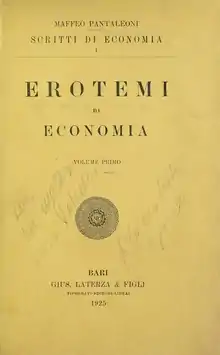Maffeo Pantaleoni
Maffeo Pantaleoni (Italian: [mafˈfeːo pantaleˈoːni]; Frascati, 2 July 1857 – Milan, 29 October 1924) was an Italian economist. At first he was a notable proponent of neoclassical economics. Later in his life, before and during World War I, he became an ardent nationalist and syndicalist, with close ties to the Fascist movement. He was Minister of Finance in the Carnaro government of Gabriele D'Annunzio at Fiume, which lasted for fifteen months between 1919 and 1920. Shortly before his death, he was elected to the Italian Senate.

Work
Pantaleoni was a major contributor to the Italian school of economics known as 'La Scienza delle Finanze'. His book Teoria della Traslazione dei Tributi (theory of tax shifting) is a pioneering study of tax incidence. According to Nobel prize winner James M. Buchanan, Pantaleoni and his followers (such as Antonio De Viti De Marco and Vilfredo Pareto) can be considered the intellectual forefathers of the modern public choice theory.[1]
Bibliography (selection)

- Teoria Della Traslazione dei Tributi, 1882.
- "Contributions to the Theory of the Distribution of Public Expenditure", 1883.
- Dall 'ammontare probabile della Richezza Privata in Italia, 1884.
- Pure Economics, 1889. ISBN 1444606816. ISBN 9781444606812
- "A proposito di Luigi Cossa e della sua "Histoire des Doctrines économiques", 1898, GdE
- "Dei criteri che devono informare la storia delle dottrine economiche", 1898, GdE
- "An attempt to analyze the concepts of "Strong" and "Weak" in their economic connexion", 1898, EJ
- "Una visione cinematografica del progresso della scienza economica, 1870–1907", 1907, GdE
- Note in Margine della Guerra, 1917.
- Politica, 1918.
- Erotemi di Economica, 1925.
References
- Buchanan, James (2008). "Italian Economic Theorists". In Hamowy, Ronald (ed.). The Encyclopedia of Libertarianism. Thousand Oaks, CA: SAGE; Cato Institute. pp. 258–60. doi:10.4135/9781412965811.n156. ISBN 978-1-4129-6580-4. LCCN 2008009151. OCLC 750831024.